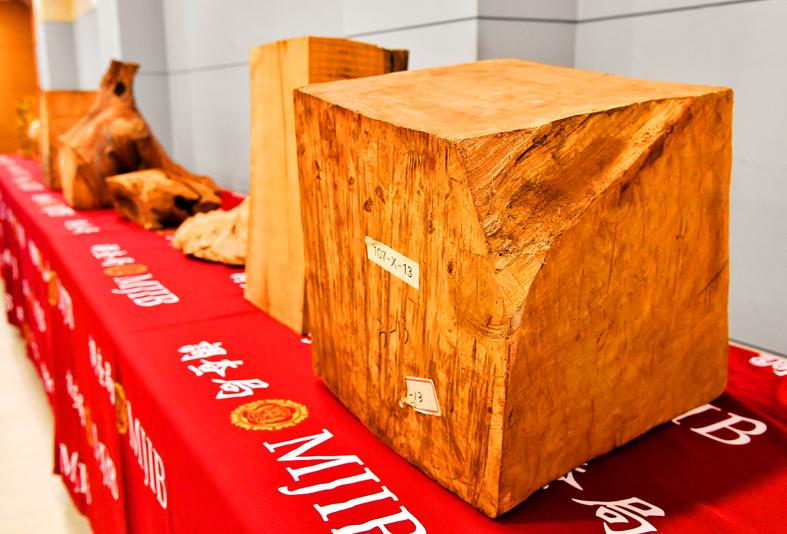To help protect the nation’s forests and guard against illegal logging, the government has established a DNA database for Taiwan cypress and Taiwan cedar trees, Minister of Justice Tsai Ching-hsiang (蔡清祥) said at a news briefing in Taipei yesterday.
The database would enable authorities to identify a particular species, and facilitate prosecution and conviction of illegal logging activities, Tsai said at the Ministry of Justice’s Investigation Bureau (MJIB) office.
The project is the product of a four-year collaboration between the MJIB, the Forestry Bureau and Academia Sinica’s Biodiversity Research Center, he added.

Photo: CNA
“In the past, ‘mountain rats,’ when caught, always claimed that they had only cut down ordinary trees, and not a protected species. Now we can make a positive identification through the database to rebut their claims and bring them to justice,” Tsai said.
A “mountain rat” refers to an individual or group engaged in illegal logging for profit.
“It is not easy to find these mountain rats, as they lurk in remote locations, in difficult terrains in the mountains. Law-enforcement agents cannot spend long periods to track them down,” MJIB Director-General Leu Wen-jong (呂文忠) said.
“It is important to protect Taiwan’s unique species of cypress, cedar and other valuable hardwood trees, and we need science and technology to help us identify materials seized at the crime scene, present this evidence in court and prosecute the offenders,” Leu added.
The project was started in 2017, with extensive work by Forestry Bureau field teams, collecting 600 tree samples in the mountains, focusing on Taiwan cypress and Taiwan cedar, which are classified as protected species under the Forestry Act (森林法), Leu said.
“It is like compiling a fingerprint database for these protected trees and giving them an identification card. The work is ongoing, with more DNA samples being added in the coming years to boost the database’s accuracy in DNA matching,” he added.
Pointing to wood samples confiscated from “mountain rats” during MJIB raids, officials said that DNA genomes from hardy plants have good preservation property.
DNA extracted from driftwood, dead trees cut down many years ago and decomposing trees can be used for identification, and even pinpoint the original location of the tree, they said.
“We will be able to tell then where the illegal logging took place, verify the location and present the evidence in court to get a conviction. This can help us to crack down on these criminal groups, safeguard Taiwan’s forests and protect the environment,” Leu said.

POSITIVE DEVELOPMENT: Japan and the US are expected to hold in-depth discussions on Taiwan-related issues during the meeting next month, Japanese sources said The holding of a Japan-US leaders’ meeting ahead of US President Donald Trump’s visit to China is positive news for Taiwan, former Japan-Taiwan Exchange Association representative Hiroyasu Izumi said yesterday. After the Liberal Democratic Party’s landslide victory in Japan’s House of Representatives election, Japanese Prime Minister Sanae Takaichi is scheduled to visit the US next month, where she is to meet with Trump ahead of the US president’s planned visit to China from March 31 to April 2 for a meeting with Chinese President Xi Jinping (習近平). Japan and the US are expected to hold in-depth discussions on Taiwan-related issues during the

‘LIKE-MINDED PARTNER’: Tako van Popta said it would be inappropriate to delay signing the deal with Taiwan because of China, adding he would promote the issue Canadian senators have stressed Taiwan’s importance for international trade and expressed enthusiasm for ensuring the Taiwan-Canada trade cooperation framework agreement is implemented this year. Representative to Canada Harry Tseng (曾厚仁) in an interview with the Central News Agency (CNA) said he was increasingly uneasy about Ottawa’s delays in signing the agreement, especially as Ottawa has warmed toward Beijing. There are “no negotiations left. Not only [is it] initialed, we have three versions of the text ready: English, French and Mandarin,” Tseng said. “That tells you how close we are to the final signature.” Tseng said that he hoped Canadian Prime Minister Mark Carney

President William Lai (賴清德) yesterday bestowed one of Taiwan’s highest honors on Saint Vincent and the Grenadines (SVG) Ambassador Andrea Clare Bowman in recognition of her contributions to bilateral ties. “By conferring the Order of Brilliant Star with Grand Cordon on Ambassador Bowman today, I want to sincerely thank her, on behalf of the Taiwanese people, for her outstanding contribution to deepening diplomatic ties between Taiwan and SVG,” Lai said at a ceremony held at the Presidential Office in Taipei. He noted that Bowman became SVG’s first ambassador to Taiwan in 2019 and

A man walks past elementary school artworks at the Taipei Lantern Festival in Ximen District yesterday, the first day of the event. The festival is to run from 5pm to 10pm through March 15.